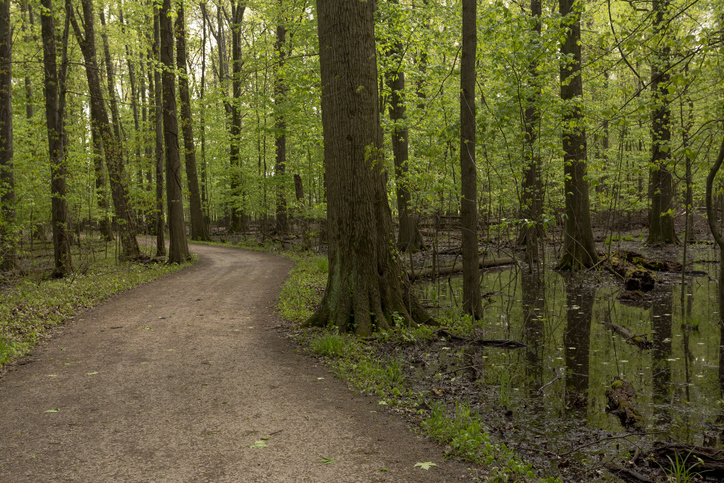Ninigret Pond Needs Extensive PFAS Testing
May 28, 2023
The views expressed in this opinion piece do not reflect those of ecoRI News and its board of directors.
Looking out over the expansive fields and trails designed for recreation, my family and I walk across the parking lot of Ninigret Park to enter Charlestown’s Annual Seafood Festival.
Faced with overwhelming numbers of stalls offering everything from lobster rolls to fried Oreos and the sounds of carnival rides, it is hard to imagine the Rhode Island park’s previous identity as the Charlestown Naval Auxiliary Field. However, the naval station has left an invisible lasting impact on this park in the form of per- and polyfluoroalkyl substances (PFAS).
This class of chemicals, known as forever chemicals, have the ability to persist in the environment and in the human body. PFAS chemicals break down incredibly slowly and can accumulate in the tissue of a number of organisms. Specifically, when PFAS accumulate in humans they have been found to cause health issues, including cancer, liver damage, hormone disruption, and reproductive issues, according to the Environmental Protection Agency.
Just two years ago, in 2021, the town of Charlestown was notified by the Army Corps of Engineers that some of the wells in Ninigret Park contained elevated levels of PFAS. The presence of PFAS in this area is not necessarily surprising, seeing as high levels of these chemicals are often found at former military sites due to their use of firefighting foam, which contain PFAS.
While it was reported that the wells where PFAS were found are not sources of drinking water, the mere presence of the chemicals in this area should be of great concern to the community. Given the persistent nature of PFAS, it should be assumed that if the chemicals are found in the wells at Ninigret Park, high levels of these harmful chemicals have likely leached into the soil of the park and into the adjacent body of water, Ninigret Pond.
If elevated levels of PFAS are found in Ninigret Pond, there will be significant implications for marine organisms that reside in this coastal lagoon, as well as anyone who consumes these organisms. This is a particularly prevalent issue in Ninigret Pond because oysters are a staple of this environment. Ninigret Pond is home to several oyster companies that rely on the waters of the pond to provide the conditions for growing and harvesting local oyster varieties.
Despite the negative impacts that PFAS contamination would have on these marine organisms,
people, and the local oyster industry, there are not any established testing initiatives for PFAS in
the Ninigret Pond or the shellfish in its waters.
Since the announcement of the presence of PFAS in Ninigret Park, there have been no updates about the additional well testing to be conducted by the Army Corps of Engineers, according to the Charlestown Citizens Alliance.
Additionally, no information has been released regarding the testing of shellfish in Ninigret Pond. The lack of action presents great health risks to community members who are positioned to potentially be exposed to PFAS during visits to both Ninigret Park or Ninigret Pond or, more indirectly, by consuming oysters originating from one of the several oyster companies that operate in the pond.
The community of Charlestown should not be left in the dark about the health risks they may face in their local environments, so I urge you to call on the town of Charleston to take swift action to address PFAS contamination as it appears the Army Corps of Engineers is unreliable in this regard.
Charlestown, R.I., resident Rachael Peacock is a senior at Bowdoin College majoring in environmental studies.
Categories
Join the Discussion
View CommentsRecent Comments
Leave a Reply
Your support keeps our reporters on the environmental beat.
Reader support is at the core of our nonprofit news model. Together, we can keep the environment in the headlines.
We use cookies to improve your experience and deliver personalized content. View Cookie Settings




So how can we start testing for the chemicals can citizen scientists do it
This is totally not surprising to me. Since 1952 my family had a summer home just adjacent to the Naval Aux Landing operation and the now PARK. We spent nearly all 50 years there .
As a kid I always wondered about the chemical leachates and the impact these would have long term. The Naval operations were consistent and steady for years. Has anyone done cluster analyses for cancer and other health conditions???? I am certain data are somewhere.
My memories of this magical place will be overshadowed now knowing the real situation. Please release the information and remain transparent forever….. just like these chemicals! No more data harboring. It is a matter of health.
We have never had one person trace ANY illness back to our farm in the 13 years and close to 5 million oysters that we have sold. Remember when Oprah shot her mouth off about the beef industry without proper documentation? This is the same exact thing and it is going to end the same exact way. You are making an unfair assumption “the lack of action presents great health risks…by consuming oysters originating from one of the several oyster companies that operate in the Pond.” THAT IS A FALSE STATEMENT PRESENTED AS FACT. Show me the evidence that our oysters present a great risk!! Ninigret Pond has sold tens of millions of oysters in the past decade and nobody to my knowledge has ever gotten sick from them.
Please research “sewage sludge/biosolids” … Sewage sludge is a MAJOR source of PFAS contamination in the environment…. I founded and chair a group in central NC called Sewage Sludge Action Network… see us on facebook… and website is http://www.sewagesludgeactionnetwork.com…….. A few years ago, I attended a 3 day conference at NIEHS in Research Triangle Park…. I met many, many PhD graduates from the best universities in the USA…. and they all thought “sewage sludge” was hog waste…. I came away, all 3 days, in tears at this predicament…. The ‘sludge industry’ has kept this a secret since the 1970s…
I agree that testing should be done and be transparent. As a neighbor and homeowner close by Ninigret Pond with a well I will bring this issue up with some friends ,neighbors and some staff I know @ URI .I will also bring this topic to the attention of the Salt Pond Coalition members. Stay tuned. T Y
THANK YOU!!! you rock for posting my post….
PS>.. I am very happy to see many articles on your website re: sewage sludge…. I am posting many of them on my facebook page…